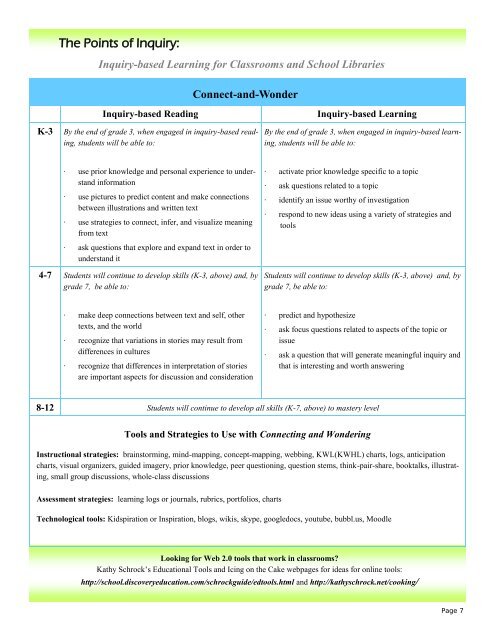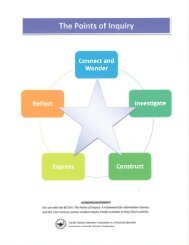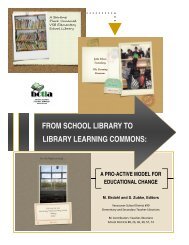PointsofInquiry
You also want an ePaper? Increase the reach of your titles
YUMPU automatically turns print PDFs into web optimized ePapers that Google loves.
The Points of Inquiry:<br />
Inquiry-based Learning for Classrooms and School Libraries<br />
Connect-and-Wonder<br />
Inquiry-based Reading<br />
Inquiry-based Learning<br />
K-3 By the end of grade 3, when engaged in inquiry-based reading,<br />
students will be able to:<br />
By the end of grade 3, when engaged in inquiry-based learning,<br />
students will be able to:<br />
· use prior knowledge and personal experience to understand<br />
information<br />
· use pictures to predict content and make connections<br />
between illustrations and written text<br />
· use strategies to connect, infer, and visualize meaning<br />
from text<br />
· ask questions that explore and expand text in order to<br />
understand it<br />
4-7 Students will continue to develop skills (K-3, above) and, by<br />
grade 7, be able to:<br />
· activate prior knowledge specific to a topic<br />
· ask questions related to a topic<br />
· identify an issue worthy of investigation<br />
· respond to new ideas using a variety of strategies and<br />
tools<br />
Students will continue to develop skills (K-3, above) and, by<br />
grade 7, be able to:<br />
· make deep connections between text and self, other<br />
texts, and the world<br />
· recognize that variations in stories may result from<br />
differences in cultures<br />
· recognize that differences in interpretation of stories<br />
are important aspects for discussion and consideration<br />
· predict and hypothesize<br />
· ask focus questions related to aspects of the topic or<br />
issue<br />
· ask a question that will generate meaningful inquiry and<br />
that is interesting and worth answering<br />
8-12 Students will continue to develop all skills (K-7, above) to mastery level<br />
Tools and Strategies to Use with Connecting and Wondering<br />
Instructional strategies: brainstorming, mind-mapping, concept-mapping, webbing, KWL(KWHL) charts, logs, anticipation<br />
charts, visual organizers, guided imagery, prior knowledge, peer questioning, question stems, think-pair-share, booktalks, illustrating,<br />
small group discussions, whole-class discussions<br />
Assessment strategies: learning logs or journals, rubrics, portfolios, charts<br />
Technological tools: Kidspiration or Inspiration, blogs, wikis, skype, googledocs, youtube, bubbl.us, Moodle<br />
Looking for Web 2.0 tools that work in classrooms?<br />
Kathy Schrock’s Educational Tools and Icing on the Cake webpages for ideas for online tools:<br />
http://school.discoveryeducation.com/schrockguide/edtools.html and http://kathyschrock.net/cooking/<br />
Page 7






